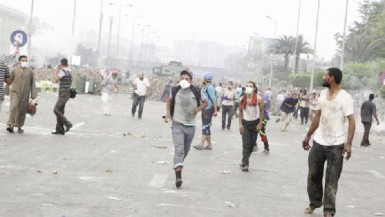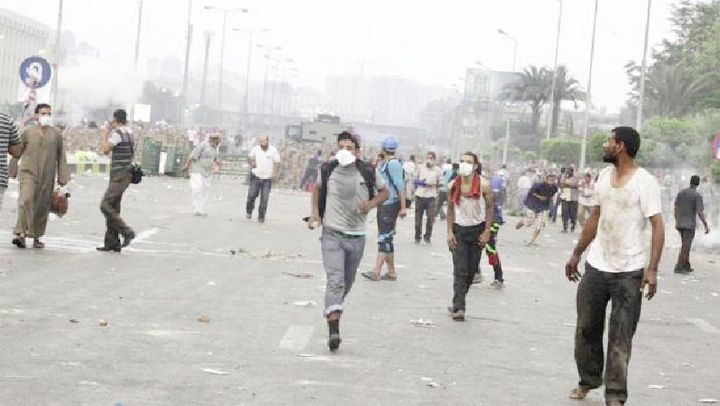CAIRO (Reuters) – Egyptian security forces shot dead dozens of supporters of ousted Islamist President Mohamed Mursi yesterday, witnesses said, days after the army chief called for a popular mandate to wipe out “violence and terrorism”.
The bloodshed, near the military parade ground where President Anwar Sadat was assassinated in 1981, plunged the Arab world’s most populous country deeper into turmoil following two turbulent years of transition to democracy since veteran autocrat Hosni Mubarak was swept from power.
Mursi’s Muslim Brother-hood, braced for a military crackdown, said men in helmets and black police fatigues had fired on crowds gathered before dawn on the fringes of a round-the-clock sit-in near a mosque in northeast Cairo.
Activists rushed blood-spattered casualties into a makeshift hospital. Some were carried in on planks or blankets. One ashen teenager was laid out on the floor, a bullet hole in his head.

The United States, treading a fine line with an important Arab ally and recipient of over $1 billion a year in US military aid, urged respect for the right to peaceful protest, and warned that Egypt was at a “pivotal moment”.
Brotherhood spokesman Ahmed Aref said 66 people had been killed and another 61 were “brain dead” on life support machines. More than 4,000 were treated for the effects of tear gas and gunshot or birdshot wounds, he told reporters. “Innocent blood was spilled,” Aref said. “We have gone back 10 years.” The Health Ministry reported a total of 65 dead, while the head of the ambulance service, Mohamed Sultanm, said later that 72 had died.
“They are not shooting to wound, they are shooting to kill,” another Brotherhood spokesman, Gehad El-Haddad, told Reuters early yesterday. “The bullet wounds are in the head and chest.”
Egypt’s Interior Minister Mohamed Ibrahim denied that police had opened fire, saying local residents living close to the Rabaa al-Adawia mosque vigil had clashed with protesters in the early hours after they had blocked off a major bridge road. He said police had used teargas to try to break up the fighting.
Well over 200 people have been killed in violence since the army toppled Mursi on July 3, following huge protests against his year in power. The army denies accusations it staged a coup, saying it intervened to prevent national chaos.
Sisi’s challenge
Hundreds of thousands of Egyptians had poured onto the streets on Friday in response to a call by army chief General Abdel Fattah al-Sisi for nationwide demonstrations to give him backing to confront the weeks-long wave of violence.
His appeal was seen as a challenge to the Brotherhood, which organised its own rallies on Friday calling for the return of Mursi, who has been held in an undisclosed location since his ousting and faces a raft of charges, including murder.
Ibrahim said Mursi was likely to be transferred shortly to the same Cairo prison where former leader Mubarak is now held. Leaders of the Brotherhood, a highly organised movement with grassroots support across Egypt, appealed for calm yesterday, but activists at the vigil voiced fury.
“The people want the execution of Sisi,” a cleric shouted to the crowd from a stage by the mosque. “The people want the execution of the butcher.” Interior Minister Ibrahim said the pro-Mursi sit-ins would “God willing, soon … be dealt with” based on a decision by a public prosecutor, who is reviewing complaints from local residents unhappy with the huge encampment on their doorstep.
The European Union and major European powers deplored the violence. US Secretary of State John Kerry urged dialogue and restraint.
“At this critical juncture, it is essential that the security forces and the interim government respect the right of peaceful protest,” he said. “This is a pivotal moment for Egypt.” The Pentagon said US Defence Secretary Chuck Hagel had spoken by phone with Egyptian army chief Sisi and urged steps “to prevent further bloodshed and loss of life.”
Washington has delayed delivery of four F-16 fighters, part of the $1.5 billion in aid it provides every year, mainly in military hardware, but says it does not intend to cut off aid to a country seen as a vital ally and which has a peace deal with neighbouring Israel.
Witnesses said police first fired rounds of teargas at Brotherhood protesters gathered on a boulevard leading away from the Rabaa mosque, with live shots ringing out soon afterwards.

